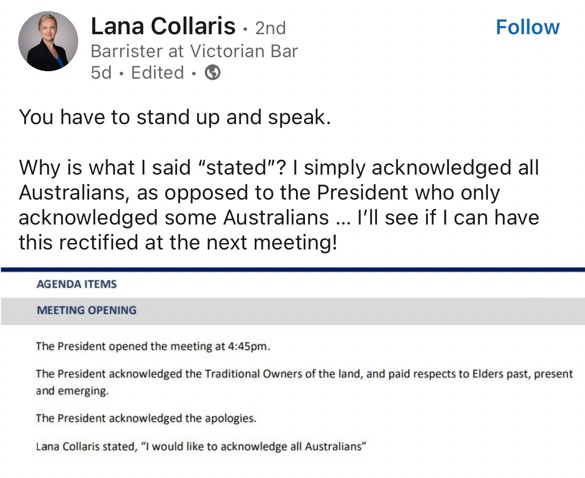Victorian Bar Racist – The Core of the Controversy

Public and legal discussions now centre much on the recognition of traditional landowners in Australia. Leading Victorian barrister Lana Collaris (Victorian Bar Racist), who just caused controversy by challenging the habit of starting meetings with acknowledgements of traditional owners, is front and front in this argument. Rather, Ms. Collaris decided to honour all Australians, a posture that has drawn both praise and condemnation.
This paper investigates the several arguments made by Ms. Collaris, examines the wider consequences of such policies on Australian legal and social systems, and investigates the responses of different interested parties.
Table of Contents
ToggleThe Core of the Controversy
Ms. Collaris’s Position
Ms. Collaris’s criticism stems from her conviction that constant acknowledgements of nation compromise Australian Crown sovereignty. In an interview, she expressed her worries, stressing that the practice sends a message contradicting the constitutional and legal basis of equality of citizenship in Australia.
“The continuous repetitious of acknowledgements sends the message that sovereignty does not exist inside the Crown,” she said.

Her choice to stray from convention was a statement of dissatisfaction with what she saw as the “implicit ceding of sovereignty” taking place in many public and business contexts. She underlined her conviction in the equality for all Australian concept, regardless of background.
Public Backlash and Support
The barrister’s activities have attracted strong criticism with charges ranging from insensitivity to plain racism. Reflecting the polarised character of the discussion, critics labelled her a “visitor” and a “introduced species.”
Ms. Collaris did, however, note considerable popular support, implying that many Australians could relate to her message.
“We are here knowing that most Australians are with us on this. We have a referendum coming forward. The facts are stated. People want Australia in which everyone is equal regardless of colour,” she said.
Legal and Social Implications
Constitutional and Legal Concerns
The points Ms. Collaris makes appeal to important constitutional and legal concerns. The Australian Constitution lays equality of citizenship as a guiding concept, and any policies seen to undermine this basis call for investigation. The barrister’s criticism draws attention to a possible legal error in including acknowledgements of nation into judicial procedures, where objectivity and respect of constitutional values rule most importantly.
Cultural and Social Dynamics
Reflecting a respect of the Indigenous legacy of Australia, acknowledgements of country and welcome to country rituals have become fundamental aspects of Australian cultural events. Critics like Ms. Collaris, however, see the abundance of these acknowledgements as a political gesture rather than a sincere cultural honour.
This difference underlines the conflict that exists between upholding cultural customs and a shared national identity. The argument begs issues on the harmony between respect of constitutional values and inclusiveness.
Read Also: Malibu Fire Forces Mass Evacuations, Impacting Celebrities and Local Residents
Reactions from Stakeholders
Legal Community
The legal community from Victoria has been split. Certain colleagues backed Ms. Collaris’s position, advocating a more inclusive approach that treats every Australian equally. Others voiced worry that her stance undercuts initiatives to right past injustices experienced by Indigenous people.
Broader Public Sentiment
Many Australians, who praised her bravery to express dissident views, connected with the barrister’s demand of freedom of expression. This reaction emphasises a rising portion of the community that believes conventional thanks are excessive.
Recommendations for Moving Forward
Encouraging Dialogue
Bridge gaps between supporters and detractors of traditional acknowledgements by means of constructive dialogues. Such talks should try to promote respect of many points of view and mutual understanding.
Balancing Traditions and Equality
Institutions have to carefully weigh the respect of Indigenous legacy against the equality ideal entrenched in the Australian Constitution. Clear policies expressing the goal and extent of acknowledgements can assist to prevent disputes.
Enhancing Public Awareness
While addressing issues about their legal and social consequences, educational programs may be rather important in guiding the public about the historical and cultural relevance of acknowledgements.
Conclusion
The controversy around Lana Collaris’s (Victorian Bar Racist) rejection to follow conventional recognition customs is reminiscent of more general social arguments in Australia. It captures the difficulties of balancing a respect of Indigenous history with a dedication to constitutional values and national unity. Encouragement of honest communication and mutual respect will be vital in determining an inclusive but cohesive future as Australia negotiates its multicultural identity.
Published by Leo Danian
Hey, I am Leo Danian, a digital marketer with more than 5+ years of experience. I specialize in leveraging online platforms and strategies to drive business growth and engagement. View more posts







